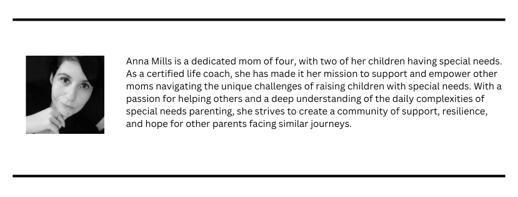
Parent Guilt is Real - Be Kind to Yourself
Coping strategies for dealing with parent guilt
Anna Mills
1/25/20255 min read
Parenting guilt is something that weighs heavily on my heart, especially when I see my child struggle with illness. Every time my son gets sick, I blame myself for his suffering. I think things like, I told the doctor he was doing better just last week. I shouldn’t have been so optimistic. I should have pushed for additional tests or a different treatment. Looking back, I realize it is ridiculous to blame myself, but it’s hard to shake the feeling.
When my son first received his diagnosis, I didn’t fully understand what it meant. At first, I trusted the doctors and followed their instructions without question. It wasn’t until years later, when his symptoms started worsening, that I began to advocate more strongly for his care.
I can’t help but wonder if I could have gotten him the specialized treatment he needed sooner would my son’s condition be better today? Sometimes I allow thoughts like that one to percolate in my head over and over again. Those thoughts do nothing to help me or my son.
I have to remind myself to take a step back and breathe. I’m doing my best as a parent. I’m not a doctor, and I had no experience with serious medical issues before this. I acted in my son’s best interest, learning along the way. And while it’s easy to feel guilty, I have to remember that I deserve some grace in this journey.
Parenting guilt is real, and it’s something many parents experience when facing their children’s health challenges. It’s essential to recognize the impact this guilt can have on our mental health and well-being. We need to be kind to ourselves and trust that we are doing the best we can with the knowledge that we have.
Parent guilt is COMMON
Parent guilt is a common feeling for many, but it can be especially intense for parents of children with special needs or a medically complex history. The question, “Could I have done more for my child?” often lingers, and it can lead to a constant cycle of self-doubt and stress. Advocacy for a child with extra needs often requires ongoing effort, and when it feels like you might not be doing enough, it can have a significant impact on your mental health.
What Is Parent Guilt?
Parent guilt refers to the feeling that you're not meeting expectations—whether they're self-imposed or external—and that you’re not doing enough for your child.
According to a study published in Journal of Pediatric Nursing, parents of children with disabilities often experience "chronic stress and feelings of inadequacy" due to the additional challenges they face in caregiving and advocacy. This type of guilt can be particularly overwhelming, as parents feel they are responsible for their child's development, health, and happiness.
The Impact of Parent Guilt on Mental Health
Parent guilt can significantly affect mental health in several ways:
Increased Anxiety and Stress Advocating for a special needs child often means navigating complex systems. The pressure to ensure our children's needs are met creates constant stress. As parents we constantly worry about making the right decisions, which leads to anxiety and tension. According to Psychology Today, chronic stress can lead to both mental and physical health issues, including burnout and fatigue.
Social Isolation When guilt sets in, many parents, myself included, tend to isolate themselves, fearing judgment from others or feeling like they are not doing enough for their child. Don’t allow this isolation to prevent you from seeking the support you need. Studies have shown that social support is critical for mental well-being, especially for parents of children with special needs. Lack of social support can exacerbate feelings of guilt and contribute to depression (Vohra et al., 2015).
Burnout and Emotional Fatigue The continuous self-questioning and constant advocacy often leads to burnout. In a study published in BMC Public Health, researchers found that parents of children with special needs experience higher levels of emotional exhaustion due to the increased demands of caregiving (Totsika et al., 2011). Burnout personally leaves me feeling drained, and directly affects my ability to keep up with the care of my family.
Negative Self-Talk and Decreased Self-Worth Negative self-talk can be common among parents dealing with guilt. It is my biggest challenge. I constantly question if I am doing enough, it’s easy to feel inadequate. This can lead to decreased self-esteem, as parents, like myself, internalize their perceived shortcomings. A study published in Psychiatry Research found that negative self-perception and guilt are strongly linked to feelings of depression and low self-worth in caregivers (Chou et al., 2013).
Strain on Relationships Parent guilt can strain relationships, especially with partners. When you feel like you're constantly not doing enough for your child, it can be difficult to communicate openly with others, especially your partner. The stress and guilt of caregiving can lead to marital strain and communication breakdowns. It’s essential for both parents to support each other to mitigate the effects of guilt.
Coping with Parent Guilt
While parent guilt is natural, it’s important to manage it in healthy ways. I highly recommend therapy by a licensed therapist. I am not one, but here are a few strategies that I found can help and try to utilize regularly:
Recognize Your Efforts: Acknowledge the hard work you’re doing, even if it doesn’t feel enough. You are advocating for your child’s needs, and every effort you make counts.
Seek Social Support: Connect with other parents in similar situations. Support groups can provide understanding, comfort, and practical advice. This one is the hardest for me as most other parents don’t quite comprehend what I am going through with my child. I have found that I just need to accept their experience is not going to be the same as mine and it is just nice to have someone there.
Practice Self-Care: Taking care of yourself isn’t selfish; it’s necessary for your mental health. Ensuring you get adequate rest, exercise, and time to unwind can help you recharge and cope with the pressures of parenting. I also struggle with this, but I am making a conscious effort everyday to do one small thing for myself.
Challenge Negative Thoughts: When you catch yourself engaging in negative self-talk, try to counteract those thoughts by reminding yourself of the progress your child is making and the advocacy you’re providing.
Remember You ARE Doing Enough
Parent guilt is a common experience for many parents of children with special needs, but it’s essential to remember that you’re doing your best. Advocate for your child, take care of yourself, and seek support when you need it. You got this!
parent guilt, special needs parenting, mental health effects of parent guilt, advocacy for special needs children, coping with parent guilt, emotional exhaustion from caregiving, managing parent guilt, special needs child advocacy tips, social support for parents, self-care for special needs parents.
Sources:
Parker, M., et al. (2018). Chronic stress in parents of children with disabilities: An overview. Journal of Pediatric Nursing.
Vohra, R., et al. (2015). Social support and its impact on the mental well-being of parents of children with disabilities. Journal of Disability Studies.
Totsika, V., et al. (2011). Parental burnout and its association with mental health outcomes in families of children with disabilities. BMC Public Health.
Chou, K. L., et al. (2013). Negative self-perception in caregivers and its correlation with depression and anxiety. Psychiatry Research.
Pakenham, K. I., et al. (2005). Caregiving and marital stress: The role of guilt in caregiving families. The Journal of Marriage and Family.



